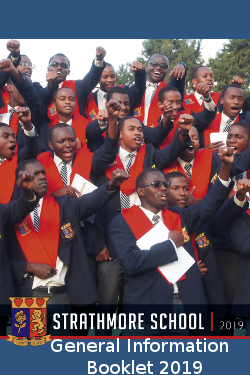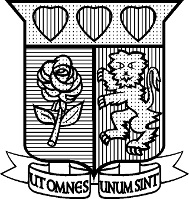Strathmore School is a private, independent, boys’ day school located in Nairobi, Kenya that follows the 8-4-4  curriculum.
curriculum.
Strathmore was started as a Sixth Form college in March 1961. In 1977 the first Form One students were admitted, and in 1987 the first Standard One pupils.
Today, there are around 630 students in the school with a significant number of them receiving financial aid.
Strathmore began as a Sixth Form College offering a full range of Arts and Science subjects. The first Form Five students enrolled in March, 1961, and sat the Higher School Certificate Examination in November 1962.
Accountancy studies were added to the College Curriculum in January, 1966, when the first students registered to prepare for the Association of Certified Accountants examinations. The first Form One students enrolled in January, 1977; during the years 1977-1980 the Secondary School was expanded to include Forms One to Four.
The College is managed by Study Centres of Kenya. The land and buildings of the College are held in Trust by Strathmore Registered Trustees which is incorporated as a charitable Trust under the Land (Perpetual Succession) Ordinance.
With the starting of the Primary School, the Trustees have organized Strathmore College into two levels: ‘Strathmore College School of Accountancy’ for post-secondary studies and ‘Strathmore School’ for primary and secondary Studies.
Check out the General Information Booklet…
Strathmore began as a Sixth Form College offering a full range of Arts and Science subjects. The first Form Five students enrolled in March, 1961, and sat the Higher School Certificate Examination in November 1962. Accountancy studies were added to the College Curriculum in January, 1966, when the first students registered to prepare for the Association of Certified Accountants examinations. The first Form One students enrolled in January, 1977; during the years 1977-1980 the Secondary School was expanded to include Forms One to Four. Accountancy studies were added to the College Curriculum in January, 1966, when the first students registered to prepare for the Association of Certified Accountants examinations.
The first Form One students enrolled in January, 1977; during the years 1977-1980 the Secondary School was expanded to include Forms One to Four.The College is managed by Study Centres of Kenya. The land and buildings of the College are held in Trust by Strathmore Registered Trustees which is incorporated as a charitable Trust under the Land (Perpetual Succession) Ordinance. With the starting of the Primary School, the Trustees have organized Strathmore College into two levels: ‘Strathmore College School of Accountancy’ for post-secondary studies and ‘Strathmore School’ for primary and secondary Studies.
The principal goal of the School is to develop the conscience and train the minds of its students so that they may usefully serve society. Above all, the School emphasizes academic excellence and moral integrity. The School brings together students of unusual promise and experienced teachers to form a community which is conducive to learning.
Through daily close contact with the students, in the class-room, in extra-curricular activities and on the sports fields, the School staff, by example and precept, strives to teach the essence of goodness, honesty, responsibility, tolerance, hard work, humility and sincerity. The School aims to provide an education based on Christian principles.
Students are prepared for the Kenya Certificate of Primary Education (K.C.P.E.) and the Kenya Certificate of Secondary Education (K.C.S.E.) national examinations at the end of primary and secondary courses respectively. The School is well-equipped to meet all the modern requirements of a balanced education. It has regularly ranked among the top ten schools in the country in public examinations.
It also has consistently placed a high percentage of its students in institutions of higher education. A system of Continual Assessment Testing in all subjects allows staff and parents to keep a close eye on each boy’s academic progress. Parents are sent a total of six reports during the year, at mid-term and the end of each term.
When a student first enrolls he is assigned a Tutor whose job is to supervise the student’s general performance and stimulate wider interests outside what is done in the classroom. The Tutor speaks with the student regularly, is available to him should problems arise, and meets regularly with the student’s parents to discuss his overall progress, and to see how he can best be challenged to develop his potential to the fullest. Older students are allowed to choose as their tutor that teacher who they feel can best help them. The spiritual guidance at the School is entrusted to the Prelature of Opus Dei. There is a Chaplain who is readily available to anyone who wishes to talk with him.
The School believes strongly in the value of association with parents, particularly at a personal level where staff and parents can work together for the benefit of each boy. This cooperation is primarily fostered through regular meetings of a Tutor with the boy’s parents. The School also organizes regular Parents Meetings, usually by classes, to discuss important topics of general interest related to the education and upbringing of secondary school age boys.
A boy’s life in the School involves continual integration and cooperation with other boys. Great emphasis is placed on a boy learning to work together with others. The boys in each class select their own Captains, who in turn choose teams within each class. Teams compete against other teams of their class and Section in sports, study points and overall behaviour and sportsmanship. Team Captains meet regularly with their class Teacher to discuss ways of improving overall class progress. All boys are given specific duties and jobs through which they are expected to con¬tribute to the well-being and running of their class and the whole School.
All boys are expected to play Sports at least two afternoons a week throughout the school year. Classes are divided into teams which compete against each other in such games as athletics, football, volley-ball, basketball and rugby. Students are encouraged to participate in School teams in competition against other schools. Membership of School teams involves regular extra practice in the evening after classes. Boys are encouraged to develop and pursue their interests by joining various co-curricula activities.
The number of applicants far exceeds the number of places available. The applicants are required to pass through a series of tests and interviews before the final selection. An interview is a requirement foradmission and applicants are expected to school with their parents for the interview. The Admission Committee selects from the applicants those students whom it feels will be able to cope with the the demanding academic standards and will become effective contributing members of the school community. Strathmore admits students of any religion, race, national or ethnic origin; the student body is made up of boys from widely differing backgrounds. Applicants who qualify for admission are also eligible for a bursary award on the basis of their financial needs and family circumstances. It is the School’s policy that no deserving boy who is academically and otherwise qualified for admission should be prevented from accepting his place because of inability to pay the fees. The Bursary Fund depends on donations; regular appeals are made to parents, past students and friends for contribution to the Fund.
